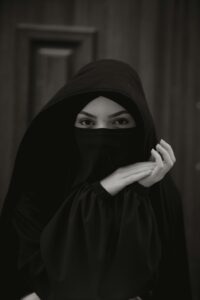The Hijab (Head Scarf)

⏱️ Estimated reading time: 6-8 minutes
The hijab is an important part of a Muslim woman’s identity and a personal act of devotion and worship. Both the Qur’an and the Hadith guide Muslim women to cover their hair and wear clothing that does not draw attention to their physical appearance when they are outside their homes or in the presence of men who could potentially be marriage candidates.
As I briefly mentioned on page 16, when a Muslim woman chooses to wear the hijab, it is a lifelong commitment, similar to a tattoo in the sense that it symbolizes permanence. It is not something one simply puts on and takes off like a baseball cap; it represents a sincere commitment to God. For many, removing it is nearly impossible or even unimaginable.
Head covering in Islam and Christianity:
The hijab in Islam, similar to the attire worn by Christian nuns, symbolizes modesty, piety, and devotion to faith. It is in no way representative of oppression, as many media outlets might suggest. Rather, it is a sign of chastity and an expression of faith. As stated both in the Qur’an and in the Bible:
“But every woman who prays or prophesies with her head uncovered dishonors her head, it is the same as having her head shaved. For if a woman does not cover her head, she might as well have her hair cut off; but if it is a disgrace for a woman to have her hair cut off or her head shaved, then she should cover her head.” Bible 1 Corinthians 11:5–6
The Virgin Mary, mother of Jesus (peace be upon them both), is the ultimate symbol of chastity and virtue. In every statue and depiction found in churches all around the world, her hair is always covered like a Muslim woman, reflecting her modesty and spiritual purity.
Question: Does not wearing the hijab make a woman any less of a Muslim?
The Prophet Muhammad (pbuh) said: ” God does not look at your bodies nor your appearances, but He looks at your hearts and your deeds”.
Wearing the hijab is an important act of devotion in Islam, but it is not one of the Five Pillars of Islam. Every Muslim woman knows that she could never stand in prayer without covering her head (just as listed in the Bible verses above). However, if she chooses not to cover her head outside her home, perhaps because she fears discrimination or that she won’t be able to remove it later, that does not make her any less of a Muslim. She is still a Muslim, and it is her faith, actions, and relationship with God that truly define her. Muslims are encouraged to treat one another with kindness, understanding, and support as everyone finds their own path toward God.
The Niqab (Face Covering)
How a woman fulfills the requirements of the hijab varies from culture to culture, but historically, the face covering was practised by many cultures before Islam and scholars say the adoption of its practice by Muslims was part of fitting into these societies (which goes against the progress brought to women by Islam).
The niqab (face covering) has brought a lot of negative attention to Islam and what it represents in Western societies.
Unfortunately, in a lot of cases what non-Muslims know most about Islam is the niqab, terrorism, and the Middle East conflict.
For these reasons, some scholars have asked Muslim women to refrain from wearing the niqab in the west because it can lead to harassment for them and act as a barrier to inviting people into the true Islam (not the one portrayed by the media). Muslim women who refuse to hear the call of the scholars and choose to wear the niqab should keep in mind that they are the ambassadors of Islam in the west and the Niqab is not the best example.
I would kindly ask these women: Did you know that it’s actually Haram (forbidden) for a woman to cover her face during Umra or Hadj?
If you’re a Muslim woman who wears the niqab and you’re unsure whether it should be removed, think about this: If wearing the niqab were truly mandatory, why would it be Haram (forbidden and sinful) for women to cover their faces and hands while before entering the rituals of pilgrimage (known as ihram) in Makkah during Hajj and Omra?
The Prophet Muhammad (pbuh) said: “Women in the state of Ihram are not to cover their faces, nor to wear gloves.” Hadith taken from Sahih al-Bukhari, Book 25, Hadith 1 and from Sahih Muslim, Book 7, Hadith 2845.

